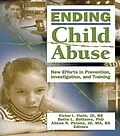Get the tools to coordinate a plan in your community!
The highly anticipated Ending Child Abuse: New Efforts in Prevention, Investigation, and Training presents an exciting vision: to end or significantly reduce child abuse. Respected social scientists and legal scholars discuss empirically sound short- and long- term multidisciplinary strategies that can be implemented in our society. Innovative and well-established concepts and approaches are clearly presented, such as specialized education, rational preventative methods, effective investigation and prosecution strategies, and the analysis of factors that influence law enforcement investigations and child abuse prevention efforts.
Several obstacles stand in the way of the elimination of child abuse, such as the failure to investigate most child abuse reports, inadequate training of frontline child protection professionals, lack of financial resources, and the dilemma that child abuse is not addressed at the youngest ages. Ending Child Abuse: New Efforts in Prevention, Investigation, and Training tackles these problems and others with practical guidelines and aggressive creative strategies that can be applied to every community in the United States. This collection is impeccably referenced and soundly supported with research.
Ending Child Abuse: New Efforts in Prevention, Investigation, and Training discusses:
- implementation of a model curriculum in child advocacy for undergraduate and graduate institutions
- forensic interview training
- extensive education of the nation's child protection professionals
- development and funding of prevention programs at the community level
- educational reforms of Montclair State University in New Jersey designed to better prepare professionals who advocate for children
- research-based interview techniques with best practice guidelines
- possible broader social and system-level reforms
- vertical prosecution of child abuse cases-with a model for its operation
Ending Child Abuse: New Efforts in Prevention, Investigation, and Training is an ambitious eye-opening source perfect for social services professionals, mental health professionals, practitioners, researchers, educators, students, and medical and legal professionals who deal with child abuse and children's welfare.
Autorentext
Victor I. Vieth, Bette L. Bottoms, Alison Perona
Zusammenfassung
Hands-on Help is a narrative review of the mushrooming field of computer-aided psychotherapy for mental health problems as a whole, from the time it began in the 1960's through to the present day. The many types of computer-aided psychotherapy and how each might be accessed are detailed together with the pros and cons of such help and the functions it can serve. The authors review prevention as well as treatment.The book describes and summarizes 97 computer-aided self-help systems in 175 studies according to the types of problem they aim to alleviate. These include phobic, panic, obsessive-compulsive and post-traumatic disorders, depression, anxiety, eating disorders, sexual problems, smoking, alcohol and drug misuse, schizophrenia, insomnia, pain and tinnitus distress, and childhood problems such as encopresis, autism and asthma. Within each type of problem the systems are described according to whether they are used on the internet, CD-ROM, phone, handheld or other device. The final chapter shows how internet self-help systems with phone or email support allow clinics to become more virtual than physical. It also discusses methods of screening suitability and of supporting users, constraints to delivery, uptake and completion, cost-effectiveness, and the place of computer-aided self-help in healthcare provision. This informative book will be essential reading for psychiatrists, psychologists and all other mental health professionals interested in broadening their understanding of computer-aided psychotherapy.
Inhalt
- About the Contributors
- Foreword (Congressman Robert E. Bud Cramer, Jr.)
- INTRODUCTION
- Ending Child Abuse: Introducing a Collection of New Perspectives and Practical Techniques (Victor I. Vieth, Bette L. Bottoms, and Alison R. Perona)
- ARTICLES
- Unto the Third Generation: A Call to End Child Abuse in the United States Within 120 Years (Victor I. Vieth)
- What We Knowand Don't KnowAbout Preventing Child Maltreatment (Sharon G. Portwood)
- Research-Based Guidelines for Child Forensic Interviews (Alison R. Perona , Bette L. Bottoms, and Erin Sorenson)
- Children First: National Model for the Vertical Prosecution of Cases Involving Murdered and Physically Abused Children (David M. Williams)
- The Master of Arts in Child Advocacy: A Contribution to an Emerging Discipline (Robert D. McCormick)
- CONCLUSION
- Ending Child Abuse (David L. Chadwick)
- Index
- Reference Notes Included
